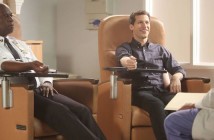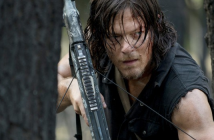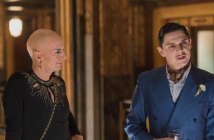June 07, 2015, 9:00 p.m. (EST), HBO
The dance of dragons is an ancient dance, its moves echoing out across eons, its steps telling tales that stretch back to the dawn of time. It’s a story of conflict, a story of struggle, a story of lines drawn in the sand. But more than that, it’s a story of choice. It’s a story that is better understood once you’ve lived in the world long enough to see what dark times can make of men, and worse, what dark times can make of you. When Shireen denies the idea that she must choose between sides, she displays naiveté her father left behind long ago. “Sometimes, a person has to choose,” Stannis tells the daughter he has decided to sacrifice. “Sometimes the world forces his hand.“
Throughout “The Dance of Dragons,” characters are forced to choose in scenarios that have no real upside, confronted with a situation where no clear victory is presented. To live in this world is to make hard choices, to confront the limits of your plans and to cut losses that might once have been deemed unassailable assets. This is the decision Jon Snow makes when he welcomes the Wildlings, whom The Wall was (ostensibly) built to keep out, into Westeros. It’s the decision Stannis makes when he gives Shireen to the flames. It’s the choice Ellaria makes when she bends the knee to Doran. And it’s the choice Dany makes when she claps her hands.
We learn much about Stannis in the moments where he lets his daughter burn to death in service to what he sees as his destiny, and much about what that destiny means to him (we don’t, perhaps, learn as much as we might about Game of Thrones as a show if this sort of display was not increasingly common for the series). Stannis’ grim adherence to duty isn’t in service of ideals, not really. Stannis doesn’t do what he does because he sees himself as the key to a better world. He does it because he thinks he can avert a much worse world, and because he feels duty bound to avoid the calamities that are to come if he does not gain enough power to fight off the darkness that is coming. Yet he sacrifices any sense of high ground, not only in his own mind, but among his men, by mercilessly giving his daughter over to the flames. It was long ago said that Stannis was not a man many men would follow, and in this moment, it is clear why. He does not put much stock in inspiring his troops (he even suggests hanging the guards who allowed Ramsay’s attack). He only puts stock in doing what needs to be done, whatever the cost.
Like Stannis, Dany is forced to watch the immediate, horrifying consequences of her decision play out before her. Not only must she witness the consequences of reopening the pits firsthand, but tradition requires her to clap to begin each bout. Dany must actively choose, each and every time, to send men to their deaths for a tradition she does not believe in, with only the vague hope that it is for the greater good to help her calm her own horror and discomfort. The sequence at the fighting pits is Dany’s whole arc this season in microcosm, as she makes impossible decision after impossible decision in an attempt to quell the class conflict she set off in Meereen, until suddenly, perhaps improbably, she finds a way to rise above, a way no one else could ever have thought of and no one else could hope to accomplish. Dany is rescued by Drogon and flies away above the city she has failed to save. She is, quite literally, ascending, but from what, and to what? She leaves behind a legacy of bloodshed and a failure to successfully pull Meereen from its past into a better future. Where does she go from here? Where can she go from here? And what will be her legacy as the ruler of Meereen? This ties Dany’s sacrifice even closer to Stannis’, in that both stories center on major characters making difficult choices that involve others’ paying the consequences. Stannis doesn’t have to burn. Dany doesn’t have to fight. They must watch what they have wrought, but both are convinced these tough choices are but steps on the path toward their ultimate destiny as ruler of Westeros. The stairs to the Iron Throne flow with blood, but only in the case of the Mad King (who notoriously cut himself on the chair frequently) is it the blood of the ruler. Usually it’s the blood of all those who fell so that the current tenant could sit the Iron Throne.
The Dorne story comes to a seeming head as Doran agrees to send Myrcella back to King’s Landing, but only alongside her betrothed Trystane, who will take Oberyn’s promised place on the Small Council. It’s a pretty neat conclusion to a messy, ambling, ineptly told story, and unless there is further complication in next week’s finale (which I imagine there will be), I am willing to call the show’s trip to Dorne a massive waste of time, burning up some great storylines from the books with little to actually show for its efforts. Ellaria gets some nice moments tonight, as she makes the decision to swear allegiance to Doran, whom she does not trust to safeguard the legacy of her lover, but most of the Dorne material still feels more like a bad Game of Thrones parody than a compelling, high-wire act of ambitious world-building (which is how I would describe the Dorne plotline in the books).
Yet again and again, the episode comes back to the idea of hard choices as an inevitable fact of life. We live by choosing, and our lives unspool as endlessly bifurcating consequences of the choices we have made. Some of those choices pay dividends, others wreak losses. Some steps take us forward, others push us back. We all see an end point, and can justify the decisions we make for the way they help us to get there. We can overlook the trees in our efforts to overtake the forests. But we cannot fail to choose. We cannot stop from engaging with the world around us and shaping it as we do. The dance with dragons is one we all know, whether we like it or not, and one we shall dance until our dying days.
The Roundup
- “If we can’t march forward and we won’t march back…”
- “You have a good heart, Jon Snow. It’ll get us all killed.”
- “You are mother to four of my nieces, girls I love very much. For their sake, I hope you live a long and happy life. Speak to me that way again, and you will not.”
- “Am I going to be happy at the end of this walk?” “You’ll find out very soon.”
- “We are not gamblers here at the Iron Bank, Lord Tyrell.” “You are the world’s best gamblers. And all the bets you won built this.”
- “The thin man wasn’t hungry today.” “Perhaps that is why a man is thin.”
- “It’s always changing, who we’re supposed to love and who we’re not. The only thing that stays the same is that we want who we want.”
- “There’s always been more than enough death of the world for my taste.”
- “It’s easy to confuse what is with what ought to be, especially when what is has worked out in your favor.”
- “One day your great city will return to the dirt as well.” “At your command?” “If need be.”
Throughout “The Dance of Dragons,” characters are forced to choose in scenarios that have no real upside, confronted with a situation where no clear victory is presented.
-
GREAT




